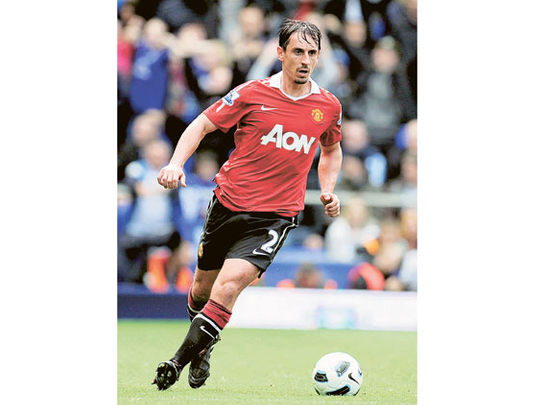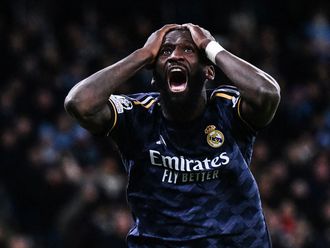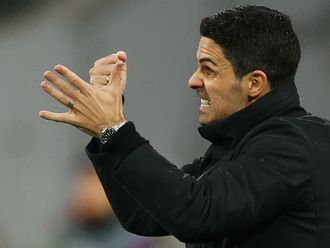
London: The first time I set eyes on Gary Neville was in November 1992, on a rainswept night at Bury's Gigg Lane ground, where Manchester United's reserves were hosting their Leicester City equivalents. The home team's line-up contained a handful of then-unfamiliar names, including those of David Beckham, Paul Scholes and Robert Savage.
Neville was among the substitutes, alongside Beckham. Like Scholes and Savage, they were members of United's all-conquering youth team, which Neville captained from centre-half. Beckham stayed on the bench that night, but Neville was sent on for the last 20 minutes, and the 16-year-old's compact eagerness made an immediate impression. Alex Ferguson, then still awaiting his first English championship with United, had travelled up the M66 to watch.
The next morning at the Cliff, United's old training ground, Neville arrived to be greeted by his fellow youth team members. "Did you get on, Gaz?" one of them asked, and they listened intently to his description of the experience. Among his coevals there was a clear sense of respect for his authority.
A brief conversation under the stand at Bury the previous night had left another impression: that of a bright, sharp, watchful intelligence. So there was not much surprise in this quarter when Neville made his first-team debut the following year, aged 17, or when he took over from Paul Parker as the first-choice right-back in 1994-95 and inherited the No 2 shirt that he would wear for 16 seasons.
Ferguson rated and trusted him, that was obvious, but also thought him not tall enough to be an effective centre-back at the highest level (although his height is officially given as 5ft 11in, he might well be an inch shorter).
Captaincy skills
There have been plenty of effective central defenders of unimpressive stature, from Daniel Passarella to Thomas Vermaelen, but the United of the early 1990s could call on the services of Steve Bruce and Gary Pallister, a pair who could write their names on the team sheet every week.
Nor would Neville be inheriting the captaincy easily, even though he had shown all the necessary attributes at the junior level. Bryan Robson, United's longest serving skipper, was in the post when he arrived, sharing the role with Bruce after his decline began. Eric Cantona took over in 1996-97, by virtue of the Frenchman's sheer presence on the pitch and in the public mind, before Roy Keane assumed the armband in 1997 for an unchallenged eight-year stretch as the dressing-room padrone.
Old-fashioned game
By the time Neville took over, in 2005, he was 30 years old and injuries were starting to take effect. Others, principally Ryan Giggs and Rio Ferdinand, were required to fill in until the start of the present season, when Ferguson accepted the reality of his captain's uncertain availability and gave the job to Nemanja Vidic.
But a captain he always was, with every ounce of his instinct. Neville played the game in an old-fashioned English way, neither giving nor seeking quarter. Ferociously combative, he tended to give away too many fouls in his early days.
"Passion" is the most overused and overvalued term in football, but it really was the special quality of Gary Neville the player. Never short of an opinion on either side of the dressing-room door, forever railing against injustice, real or imagined, he was Manchester United and he was England, through and through. Everyone else was the enemy, a conviction which could lead him into moments of rashness, such his unwise response to the Kop's baiting.
Like his 400 league appearances for United, his 85 full international caps should have been many more more even than the haul of Beckham, with whom he formed so productive a partnership for club and country. The youngest player in Terry Venables's Euro 96 team, he missed the semi-final defeat to Germany through suspension, missed the 2002 World Cup with a broken foot, missed three games in Germany four years later with a calf injury, missed vital games in the ill-fated Euro 2008 campaign, and lost his place in Fabio Capello's squad before the finals in South Africa.












